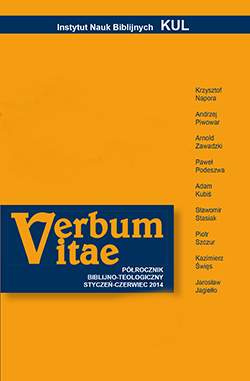Marność ludzkiego życia w Księdze Koheleta?
The Vanity of Human Life in the Book of Ecclesiastes?
Author(s): Andrzej PiwowarSubject(s): Christian Theology and Religion
Published by: Katolicki Uniwersytet Lubelski Jana Pawła II - Wydział Teologii
Keywords: The Book of Ecclesiastes; heḇel; futility/vanity; brevity; transience; human life; Eccl 3:19; Eccl 6:4-12; Eccl 7:15; Eccl 9:9; Eccl 11:8-10
Summary/Abstract: The noun heḇel is the most characteristic term in the whole Book of Ecclesiastes. Because of this word, many people perceive the book as the one which deals primarily with vanity and which posits that everything is futile (cf. 1:2 and 12:8). The present article aims to answer the question posed in its title: Does Qoheleth really claim human life to be futile? The first part of the article comprises the analysis of the noun heḇel in the Old Testament. Subsequently, the word’s usage and meaning in the Book of Ecclesiastes are explored. The final part of the article analyzes the texts that make use of the word heḇel to speak about human life (namely, 3:19; 6:4-12; 7:15; 9:9; 11:8-10). The interpretation of these texts and the supporting arguments resulting from the analyses conducted by other scholars (e.g. C.L. Seow, L. Mazzinghi, K. Bardski, G. Ravasi, A. Bonora, T. Krüger i L . Schwienhorst-Schönberger) lead to the conclusion that Qoheleth does not judge human life as futile. What he claims instead is that human life is brief, transient and passes quickly.
Journal: Verbum Vitae
- Issue Year: 2013
- Issue No: 24
- Page Range: 39-72
- Page Count: 34

